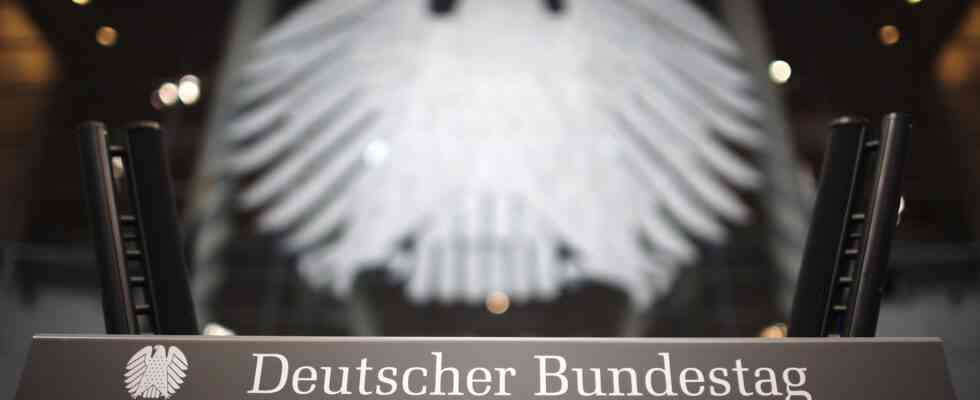background
Status: 11/23/2022 03:47 am
Opposition to government – the general debate on the draft budget is taking place in the Bundestag today. It can be one of the rhetorical highlights in the Bundestag. Of rituals, reflexes and recipes – a review and outlook.
What is the general debate?
The general debate, also known as the general debate, is actually about budget issues – but the opposition traditionally uses it for fundamental criticism of the federal government. The debate takes place during the budget weeks, i.e. when the Bundestag is discussing the government’s spending for the following year.
It will be opened by the largest opposition faction – currently that of the CDU and CSU. Depending on your rhetorical talent, the tone is set here for the further course of the debate. The chancellor then defends the policies of his or her government – so far, so ritualized.
Here, too, the gain in political knowledge or the entertainment value depends on the art of speech. If you can speak freely instead of just reading from the manuscript, you will definitely collect plus points from the audience. The parliamentary groups of the governing coalition and the parliamentary groups of the opposition follow, in descending order of the number of seats. The debate is considered the highlight of a long budget week: the parliamentary groups usually send their best speakers.
What is the occasion?
Strictly speaking, it is actually about the budget of the Chancellery: 3.9 billion euros for the year 2023. In the previous year it was 3.86 billion.
A good two billion euros are to be available for the culture officer Claudia Roth, and 41.5 million euros for the tasks of the integration officer Reem Alabali-Radovan. The Eastern Commissioner Carsten Schneider is to receive a budget of 15.4 million euros, almost twice as much as in the previous year. In addition, 16.39 million euros are to go to the Independent Control Council. He checks the monitoring by the Federal Intelligence Service.
What is the difference to other debates?
There are different forms of debate in the Bundestag. In addition to the general debate, government surveys and government declarations should be mentioned here. The government polls are always held on Wednesdays at 1 p.m. during session weeks. At least one member of the federal government takes part, and members of parliament can ask questions on current topics. The Federal Chancellor is surveyed three times a year. It takes place in the last weeks of the session before Easter, before the summer break and before Christmas.
With a government declaration at the beginning of their term of office, the Federal Chancellor presents the Federal Government’s plans to the Bundestag. However, members of the federal government can also make government statements during the electoral period. Before EU summits, for example, chancellors usually make government statements in the Bundestag.
There are also regular arguments during the “debate on topics of general current interest”, the so-called current hour. In addition, controversial bills can give rise to controversial debates.
How did previous general debates go?
Even otherwise reserved speakers like Chancellor Olaf Scholz verbally bring out heavy artillery in the general debate. At the beginning of September, a combative Scholz could be seen, there was talk of “Scholz on fire”, who accused opposition leader Friedrich Merz of being “wrong”. Merz had previously described the traffic light coalition’s energy policy as “madness” that had to be stopped.
There were particularly heated arguments in previous electoral periods after speeches by the AfD – after the 2017 federal election it was the largest opposition party and was therefore allowed to open the general debate. When the then AfD parliamentary group leader Alexander Gauland railed against the migration policy of Chancellor Angela Merkel’s grand coalition in September 2018, SPD MP Martin Schulz spoke of “means of fascism” and wished Gauland on the “dung heap”.
During her term in office, Angela Merkel usually countered the attacks coolly, even when the SPD leader at the time, Sigmar Gabriel, mocked the black and yellow federal government in 2010: “For a year you have been on a journey of self-discovery together with your cabinet colleagues. Against your government and what you do say about themselves, the children’s shop of the ’68ers is as disciplined as a Prussian cadet school.” Merkel replied: The government is observing with interest “how you are gradually taking a step backwards” and found that the SPD had a “certain tendency to no longer talk about central issues with the necessary seriousness”.
Merkel’s style was not always well received. In 2007, Renate Künast, then leader of the Greens parliamentary group, said: “It was a total failure this morning!”
But Merkel was also able to attack: In 2003, as leader of the opposition, she said to the then SPD Chancellor Gerhard Schröder: “You sit down and say: We need cherry cake. Believe us, we’ll start telling you the recipes, how to get cherry cake, if you need cherry cake? Bake it and we’ll be happy to eat it, Chancellor.”
Eventually she even got personal: “You know what people really like, that’s your constant grinning and laughing on the government bench.”
From 2002 to 2005 Angela Merkel was the leader of the Union faction in the Bundestag.
What will this time be about?
As in the previous government statements, it is likely to be about currently controversial issues. It is to be expected that the federal government’s handling of the consequences of the Ukraine war will be in the foreground – including the relief and the planned citizens’ income, on which the mediation committee is supposed to bring an agreement today.
General debate in the Bundestag
Lothar Lenz, ARD Berlin, November 23, 2022 3:47 a.m

